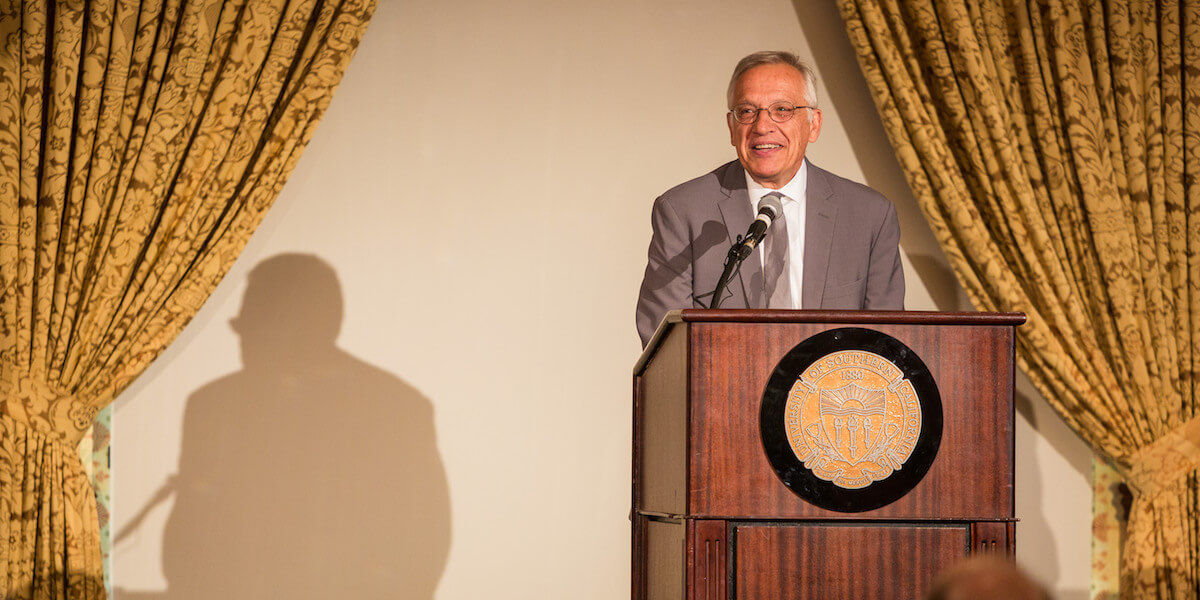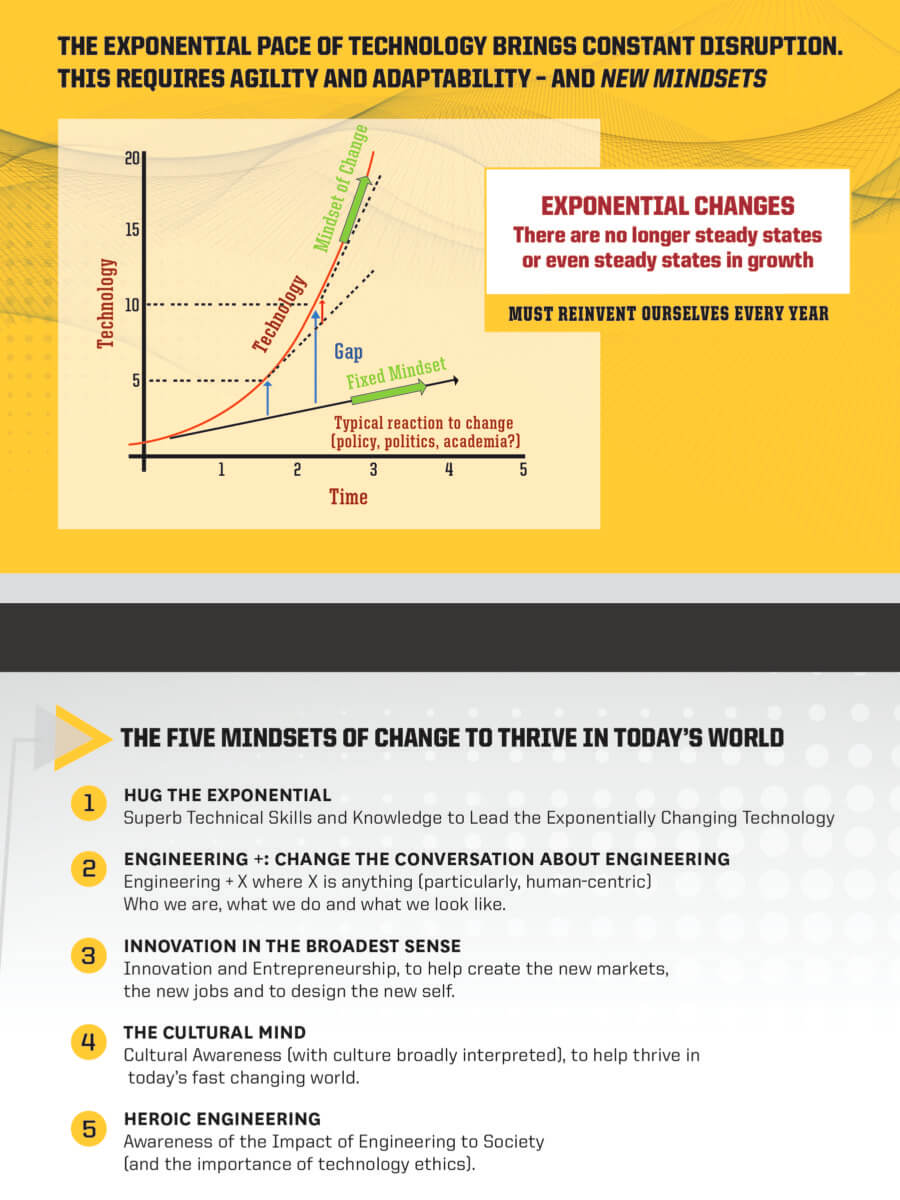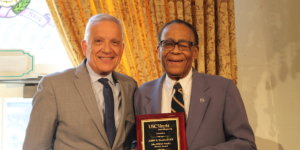
Dean Yannis C. Yortsos (Photo/Matthew Lin)
In his Sept. 18, 2018 “State of the School” address, USC Viterbi Dean Yannis C. Yortsos discussed the concept of homeostasis, or how organisms, including humans, seek a state of internal equilibrium to maximize harmony and happiness. The dean extended this analogy to include organizations, such as the USC Viterbi School of Engineering.
He said that such a state, to be reached through a commitment to service and a commitment to leadership, will also make a change in culture, which USC Dornsife Professor Antonio Damasio characterizes with the property of being “enduring and prevailing.”
“What, then, is the homeostasis of our own Viterbi school? One that wants to be enduring and prevailing? And what role do we as faculty and staff play in this?” Yortsos asked. “Serving our constituencies and leading in thought, scholarship, innovation and impact. We are here to serve. We are here to lead.”
The dean warned however, that leading has never been more challenging than in our “exponentially changing world.” To stay ahead of the curve, faculty, staff, students – literally everyone – must constantly reinvent themselves every year. They must also embrace a “mindset of growth” that prizes lifelong learning, new ideas and innovation over a “fixed mindset” that fears the unknown. “Indeed, leading is in another deep sense, serving,” Yortsos said.
The dean also shared news about the recognition USC Viterbi has recently received for its overall excellence and the quality of it programs. U.S. News, for instance, recently named our graduate program in the top 10 in the country, while our online graduate programs ranked No. 1. He added that this year’s freshman class is 45 percent women, an all-time high, 23 percent under-represented minorities and 17 percent international. Partly as a result of this diversity, Yortsos said, USC Viterbi’s first-year class is “the best in our history.”
On homeostasis
We live in truly unprecedented times. The times call for us, an engineering school of high standing, to continue engaging in two important functions: to serve and to lead. These are not contradictory- serving is a form of leading, and leading a requirement of serving.
In his new book, “The Strange World of Things,” our esteemed Dornsife colleague Antonio Damasio talks about the concept of homeostasis for individual organisms (and for humans): That every organism is seeking a state of homeostasis, one of internal equilibrium that maximizes harmony and happiness. Emotions and feelings are indicators of how far or how close we are in reaching this state.
I am more and more inclined to think that organizations are also characterized by a form of homeostasis- let’s call it a mission or a vision. Such homeostasis in fact dictates the culture surrounding us. And which culture, Damasio states, is characterized by its drive to be “enduring and prevailing.”
What, then, is the homeostasis of our own Viterbi school? One that wants to be enduring and prevailing? And what role do we as faculty and staff play in this? In today’s turbulent world, this becomes an even more crucial question. The recent events were just a strong reminder. For an answer, I gave you a hint before. Serving our constituencies- and leading in thought, scholarship, innovation and impact. We are here to serve. And we are here to lead.
On serving diverse constituents
About 10 years ago, I articulated the idea that we should view ourselves as servant of our constituencies. What are our constituencies? Fundamentally, and essentially, our students. And, by extension, parents, alumni, and supporters. But our constituencies are also larger entities, not as well defined: academia, industry and the society at-large. Closer to home, and for staff, faculty is an important constituency- and vice versa: faculty should consider staff as its own important constituency, as well.
How well we are serving our constituencies can only be checked by transparency and accountability. This fundamental understanding reflects two key facts: In our school, our offices and functions are a monopoly. There is one dean, one office of faculty affairs, one office of budget and HR, one department of say biomedical engineering, one chair of the same. And it is only by having a fundamental and deep commitment to service- from all our constituencies- one that is transparent and accountable, that we can constantly strive for a state consistent with our aspirations and with our goals. A state of homeostasis, in which all of our constituencies would be proud to say: I am fortunate to be associated with USC Viterbi. I am fortunate to be a Viterbi student; Viterbi staff; Viterbi faculty; Viterbi alumnus; and a Viterbi supporter. And that society-at-large will say, “we are fortunate for Viterbi’s existence, and for it being enduring and prevailing.”
On leading
Serving our constituencies – transparently and accountably – is one of two of our fundamental duties.
But we must also lead- and lead in an exponentially changing world. As your handout shows, this requires us to reinvent ourselves every year- by having a mindset of growth, and by constantly questioning fixed mindsets. Indeed, leading is in another deep sense, serving.

Now, in our exponentially changing era there are no longer any steady states, not even steady states in growth. Our era brings disruption, which requires agility and adaptability – and new mindsets. In today’s world this requires commitment, courage, stamina and constant innovative thinking.
On “Times of Accelerations”
In his book “Thank You for Being Late,” Pulitzer prize-winning columnist Thomas Friedman describes our era as “times of accelerations,” where nearly everything is in flux and the challenges and opportunities are greater than ever. Consider: Taking 30 linear steps will take you halfway across the room. But when the steps you take are exponential (say the next step is twice the previous one), then 30 exponential steps will take you around the Earth 26 times! These are the times we are living in.
According to Friedman:
“We are living through one of the greatest inflection points in history – perhaps unequaled since Gutenberg, a German blacksmith and printer, launched the printing revolution in Europe, paving the way for the Reformation. The three largest forces on the planet – technology, globalization and climate change – are all accelerating at once. As a result, so many aspects of our societies, workplaces and geopolitics are being reshaped and need to be re-imagined.”
Indeed, what is becoming most important today is flow, changing and becoming, rather than stock, a static state of being. Which inevitably leads to the question of lifelong learning: Today and tomorrow we will need to know more, update what we know more often, and do more creative things by being self-motivated. The question emerges: How do we change our mindset in that direction?
On this year’s undergraduates
This year’s freshman class was the most selective ever, with about 13,000 applicants – a 10 percent increase over last year – vying for about 410 freshman slots. The entering class is in fact much larger- we had 530 freshmen enrolled. Among them we have 220 University Scholars, 74 National Merit Scholars, with students coming from 24 different countries and 47 different states.
We continue leading in changing the conversation about engineering, what it is, who we are, and what we look like.
This year’s freshman class is nearly 45 percent women, a historic high for the school, which exceeded last year’s high of 44 percent. Today, more than one-third of USC Viterbi undergraduates are female – much higher than the 20 percent national average. The entering class is 23 percent under-represented minorities; 17 percent first generation; and 16 percent international. Importantly and partly as a result of this diversity, our freshman class is the best in its history. Of course, I said the same thing last year, and the year before, and I am sure will say the same next year…
On graduate programs
Our graduate programs are as robust as ever. At a time when most of our peers have reported a sizeable decrease in applicants to their programs, our master’s pool increased 3 percent overall, while our Ph.D. applications jumped 13 percent, including a 17 percent increase for women and a 27 percent increase for underrepresented minorities.
This year’s incoming graduate class is comprised of 32 percent women.
On changing the conversation about engineering
We are indeed changing the conversation about engineering!
So too is the USC Chapter of the National Society of Black Engineers, which won the organization’s coveted 2018 National Chapter of the Year. The national honor reflects USC NSBE’s commitment to academic excellence, professional development, and community outreach.
We are also committed to serving the local community. Toward that end, we are piloting a school-wide volunteer initiative: 100,000 hours of heroic engineering. Using a mobile platform to explore volunteer opportunities and track engagement, students will commit to service projects, especially in our local community.
Imagine if every school in the nation committed to such an initiative, something, by the way, I am planning to start. To change the conversation about engineering. To make engineering heroic engineering.
During the last several years, I have been the chair of the diversity committee of the Engineering Deans Council, in which capacity I helped lead a diversity initiative across the nation. As you may already know, this initiative is now signed by more than 215 deans nationwide. This remarkable commitment entails efforts from K-12 to community colleges and to faculty.
It is because of this mindset that the American Society for Engineering Education awarded USC Viterbi the ASEE President’s Award for 2017. This is the first such honor for USC and one of few ever bestowed to an engineering school.
On USC Viterbi accolades
In the more conventional rankings, US News named our graduate program in the top 10 in the country- and in the top five among private schools after MIT, Stanford, Caltech and Carnegie Mellon University.
Our online graduate programs were ranked No. 1 in computer science and No. 2 in engineering in general. And our Games program, run jointly with the School of Cinematic Arts, was ranked again the top program in the nation.
Consider also the MIT TR-35, which every year singles out the world’s 35 top innovators under the age of 35. In the last 10 years, 12 of our junior faculty (eight of whom are women) were singled out for this distinction. This year, we had yet another winner. Except, that it was now for Niki Bayat, Ph.D. student in chemical engineering, who became the first USC doctoral student named as a TR-35 winner. We cannot be more proud of her distinction.
On Heroic engineering
This fall, Professor Burcin Beceric created an innovative new one-year-long, one-of-a-kind course – known as “Innovation in Engineering Design for Global Challenges,” with a key theme to create life-saving or life-improving engineering innovations. Run in collaboration with UNICEF, the United Nations High Commissioner for Refugees, Engineers Without Borders, the Vatican and the Min Family Engineering Social Entrepreneurship Challenge, this course could eventually make a real contribution in bettering the lives of the estimated 68.5 million people currently living as refugees. Twenty-six USC students – many from USC Viterbi – just spent 10 days in Greece to partner with refugees living in camps on the island of Lesbos; Our jet-lagged students only returned last night. In Greece, they began identifying life-saving or life-improving innovations, such as new approaches to clean water and energy, to help the most vulnerable and hardest-to-reach people impacted by the refugee crisis.
You may know by now the definition of technology I find most apt: Leveraging Phenomena for Useful Purposes. Brilliant technological advances have been motivated by a variety of needs and purposes. But an increasing subset among them involves moral purposes, purposes that help society at-large, purposes associated with what we would like to call “Heroic Engineering,” a term coined by our Board of Councilors member Megan Smith, the third CTO of the US Government.
On Engineering + (X)
Engineering is at a most privileged position because it is the enabling discipline of our times. Because it leverages phenomena for useful purposes. All kinds of phenomena: Physical, Chemical, Geological, Biological, Behavioral and Social. And here at USC Viterbi we have termed this as Engineering + (X). Indeed, engineering has become the most enabling discipline to all disciplines, the sciences, and the arts.
Such partnerships in research abound. However, I wanted again to single out, in particular, the use of Improv in our Engineering Writing Program to help our students learn to communicate and better express themselves– to make eye contact rather than ground contact… Call this Engineering + Theater – Act II.
ISI is a most spectacular organization that advances many Engineering + (X) research, from advancing information processing to computer and communications technologies, with synergies and applications across many disciplines. Under Craig Knoblock’s leadership, with Prem Natarajan on an-one-year leave, our crown jewel research institute continues being a trailblazer in advancing computer science in creative and groundbreaking ways and in service to the nation. Just this past year, ISI’s research expenditures have surpassed a record $100 million for the third year in a row – ranging from machine learning to cyber security and to Quantum computing.
As it celebrates its 46th anniversary, ISI continues to push the boundaries. Earlier this year, IARPA awarded the institute $16.7 million to develop an automated information translation and summarization tool to quickly translate obscure languages. And at ISI’s new Boston office, experimental physicist Jonathan Habif leads the Laboratory for Quantum-Limited Information (QLIlab) to understand and demonstrate the fundamental physical limits for extracting information from physical signals.
On the State of the School
So, as you can see from this short review, and in the midst of new challenges, the State of the School is strong. It is strong because of all that you do as faculty and staff. And as we move forward in our exponential world, remember the need for constant reinvention and for a mindset of growth- of thinking and acting forwards and outwards.
In turbulent times, it is easy to get sidetracked and lose focus. But such focus is quickly regained when we all remember that we are here to serve (transparently and accountably) and we are here to lead (the exponential and acceleration times). How we balance these two tremendous duties successfully, with purpose and moral fortitude and with joy is our homeostasis – the Viterbi homeostasis.
Thank you and fight on!
Download complete 2018 State of the School Address (PDF)
Published on September 21st, 2018
Last updated on July 14th, 2022











